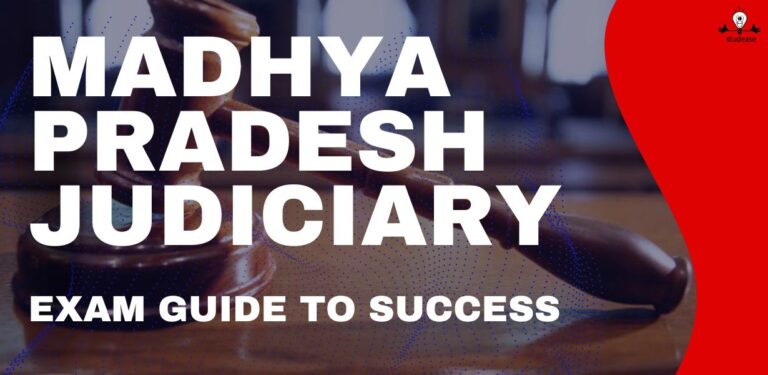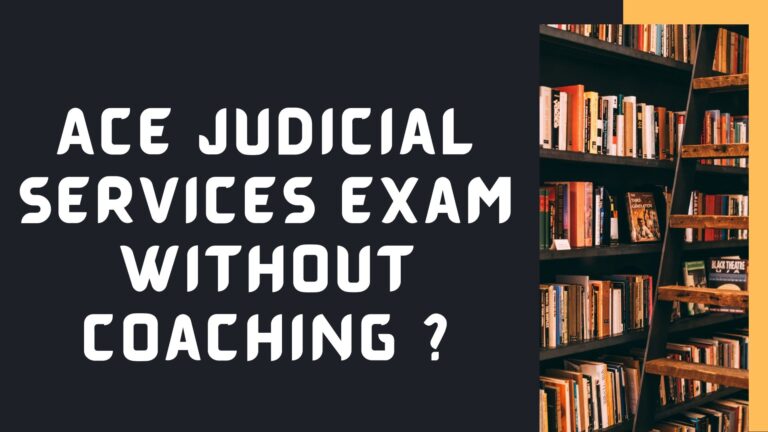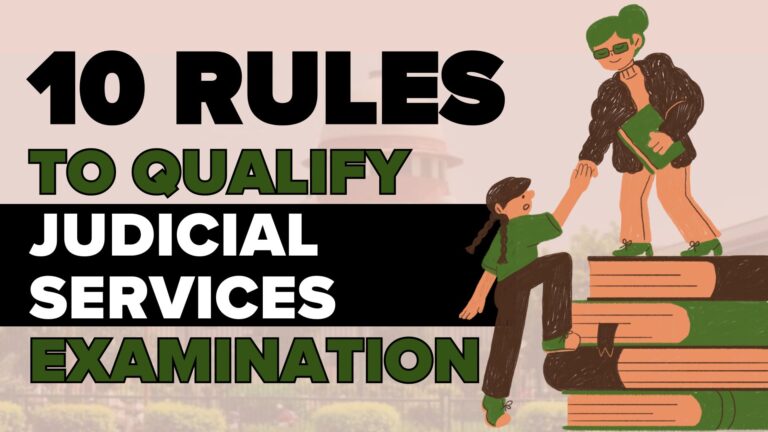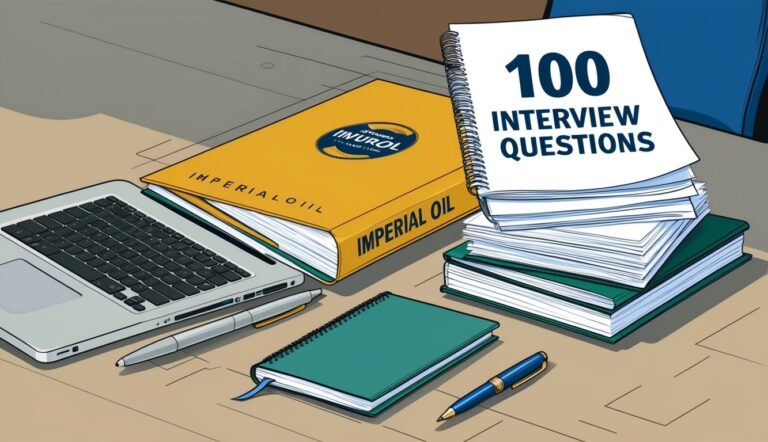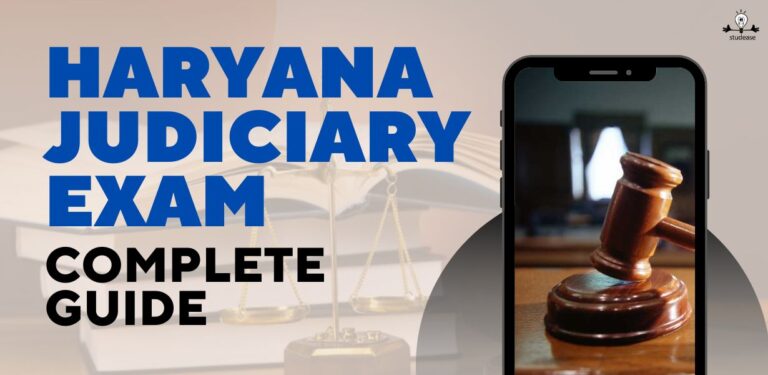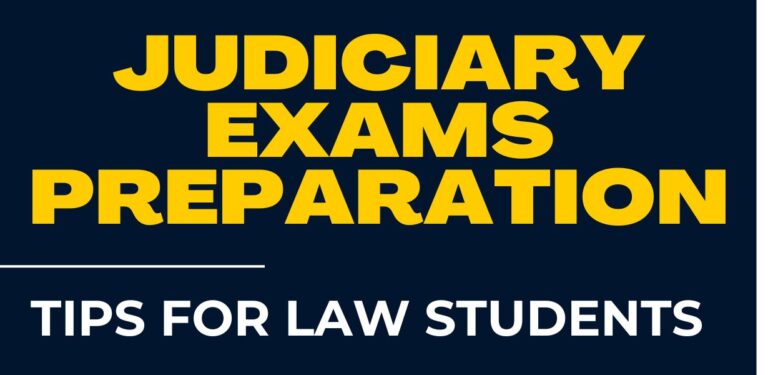110 Interview Questions Capital One: Candidates Should Master for Success
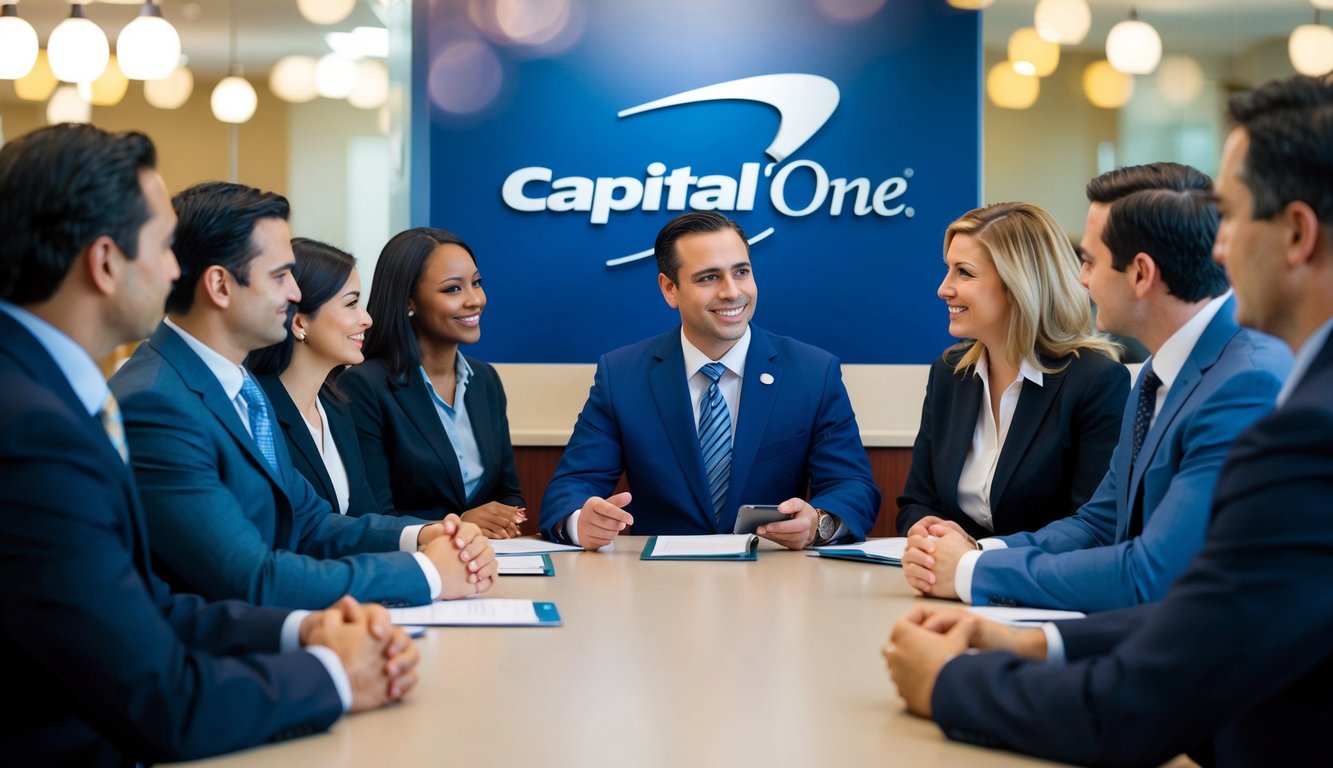
Preparing for an interview at Capital One can be both exciting and challenging. It helps to know the kinds of questions you might face. These questions often focus on various skills and scenarios to fully assess your readiness. This is a comprehensive list of 110+ Interview Questions for Capital One Bank Interview.
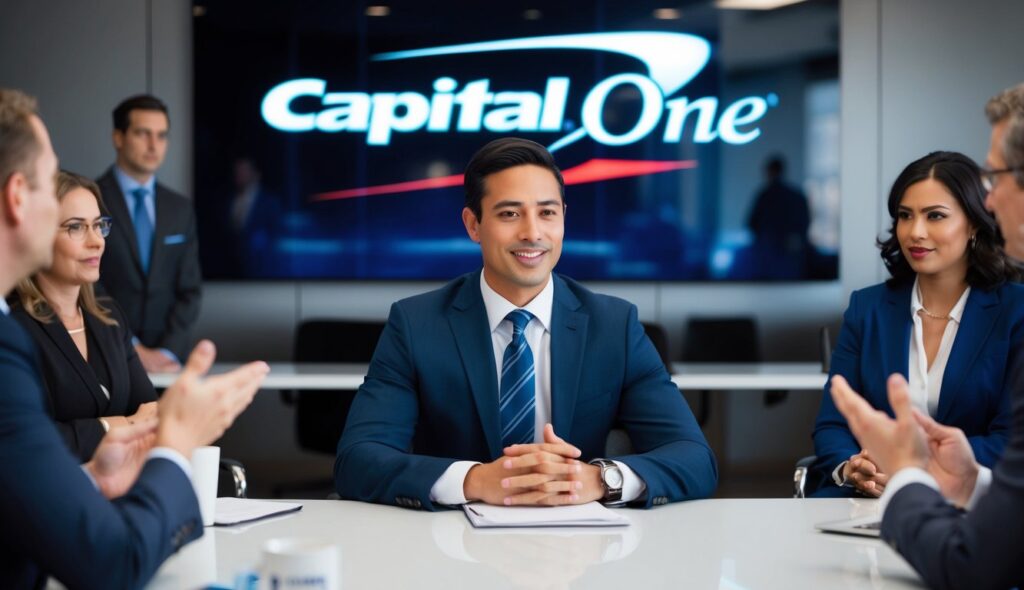
Understanding the type of interview questions can make a big difference in your confidence and performance. Familiarizing yourself with questions about problem-solving, teamwork, and technical skills will give you an edge.
Capital One is known for its thorough process, so being well-prepared is crucial.
Apart from technical questions, expect to discuss your past experiences and how they align with the role you’re aiming for. By honing your answers beforehand, you can leave a strong impression, showing you are the right fit for Capital One.
Understanding the Capital One Interview Process
When preparing for a Capital One Interview, it’s essential to know the different stages and what each one entails. Expect a mix of online tests, a Power Day of interviews, and specific challenges depending on the role.
Stages of Interviewing
One of the first steps is the Online Assessments. You need to demonstrate strong analytical and problem-solving skills through these assessments.
Different roles may have specialized challenges. For example, technical positions might include specific coding tests or case studies. Being well-prepared and familiar with the company’s values and expectations can make a significant difference in your performance.
Preparation Strategies for Capital One Interviews

Getting ready for a Capital One interview means doing your homework on the company and practicing common interview questions. You need to familiarize yourself with their work culture and be ready for both behavioral and technical questions.
Research and Company Culture
Focus on learning about Capital One’s mission and values. This will help you understand their goals and what they expect from employees. Check out their website, recent news, and any social media profiles.
Talk to current or former employees if possible. They can provide insights into what it’s like to work there. Knowing the company culture will help you fit your answers to what the interviewers are looking for.
Mock Interviews and Example Answers
Practice is the key. Conduct mock interviews with friends or use interview prep platforms. This helps you get comfortable with the format and types of questions.
When preparing, think of concise, clear answers to standard interview questions. For example, prepare a short story about a time you solved a problem or worked with a team. Use these stories to show your skills and adaptability.
Technical Interview Preparation
For technical roles, brush up on relevant skills. Practice coding problems using online platforms like LeetCode or HackerRank. Make sure your solutions are correct and efficient.
Understand the basics of algorithms and data structures.
You should be able to explain your thought process clearly during the interview. It helps to review any past projects and be ready to discuss your role and achievements.
Common Interview Questions at Capital One Bank

At Capital One, interviews often cover a range of topics such as your past behavior, technical skills, analytical thinking, and business knowledge. Understanding these different areas can help you prepare for the interview process effectively.
Behavioral Interview Questions for Financial Institutions
Behavioral questions focus on how you have handled situations in the past. Employers want to see how your experiences can be an asset.
Examples include:
- Describe a time when you faced a significant challenge at work. How did you handle it, and what was the outcome?
- Can you give an example of a situation where you had to work collaboratively with a team? What role did you play, and what was the result?
- Tell me about a time when you had to make a difficult decision with limited information. What process did you follow, and what was the outcome?
- Describe an instance when you had to deal with a difficult colleague or customer. How did you approach the situation, and what did you learn from it?
- Have you ever taken the initiative to improve a process or project? What steps did you take, and what impact did it have?
- Share an experience where you had to adapt to a significant change at work. How did you manage the transition?
- Can you discuss a time when you received constructive feedback? How did you respond, and what changes did you make as a result?
- Describe a project you worked on that required strong analytical skills. What was your approach, and what were the outcomes?
- Tell me about a time when you had to meet a tight deadline. How did you prioritize your tasks, and what was the result?
- Can you provide an example of a goal you set for yourself and how you achieved it? What challenges did you face along the way?
These questions give insight into your problem-solving skills and teamwork abilities. Practicing how you explain past experiences can greatly benefit your interview.
Technical Interview Questions: Capital One
Technical questions assess your knowledge and skills relevant to the job. If you’re applying for a tech position, you may encounter programming or data analysis problems.
Examples include:
- What are the key components of a banking system architecture? How do they interact with each other?
- Can you explain the concept of risk management in banking? What tools or methodologies do you use to assess and mitigate risks?
- How do you ensure compliance with regulations in a banking application?
- Describe the process of transaction processing in a banking system. What are the critical steps involved?
- What is the role of a data warehouse in banking, and how does it support decision-making and reporting?
- How would you implement fraud detection mechanisms in a banking application? What technologies or algorithms would you consider?
- Explain the differences between various payment processing methods (e.g., wire transfers, credit card transactions). What are the technical implications of each?
- What is an EMV chip card, and how does it enhance security in credit card transactions?
- Describe how you would design a mobile banking application. What security features would you prioritize?
- Can you explain the importance of API integration in banking systems? How do APIs facilitate services like account aggregation or payment processing?
Candidates often need to solve coding challenges or discuss specific software. Be ready to demonstrate your technical expertise clearly and confidently.
Case Interview Questions: Capital One Bank
Case questions evaluate your problem-solving and analytical skills. You might be given a real-world scenario to address.
Examples include:
- A retail company is experiencing a decline in sales. What steps would you take to analyze the situation and recommend solutions?
- A bank wants to launch a new credit card targeted at millennials. What factors should they consider in their market entry strategy?
- A telecommunications company is considering expanding its services to a new region. How would you evaluate the potential profitability of this expansion?
- An airline is facing increased competition and decreasing customer satisfaction. What strategies would you suggest to improve their market position?
- A healthcare provider wants to reduce patient wait times in their clinics. What analysis would you perform, and what recommendations would you make?
- A tech startup is looking to increase user engagement on its platform. What metrics would you analyze, and what strategies would you propose?
- A food delivery service is struggling with high operational costs. How would you approach identifying the root causes and improving efficiency?
- A manufacturing company is considering automating part of its production process. What factors should they consider, and how would you assess the return on investment?
- A nonprofit organization is looking to increase donations. What strategies would you recommend to enhance their fundraising efforts?
- A financial services firm is experiencing high employee turnover. What steps would you take to diagnose the issue and recommend solutions?
These require you to think creatively and logically. Practice solving business problems under time constraints to prepare for this section.
Business Analyst Interview Questions
For business analyst roles, expect questions about data analysis, business processes, and customer insights.
Examples include:
- Can you describe your experience with requirements gathering? What techniques do you use to ensure you capture all necessary information?
- How do you prioritize competing requirements from different stakeholders? Can you provide an example of how you’ve managed this in the past?
- What tools or methodologies do you use for modeling business processes? Could you walk us through a specific example?
- How do you handle changes in project scope or requirements once a project has already begun?
- Can you explain the difference between functional and non-functional requirements? Why are both important?
- Describe a time when you identified a significant business problem. How did you approach solving it, and what was the outcome?
- What techniques do you use for data analysis? Can you provide an example of how your analysis influenced a business decision?
- How do you ensure effective communication between technical teams and non-technical stakeholders?
- Can you give an example of a successful project where you played a key role as a Business Analyst? What were your contributions?
- What metrics do you consider important for measuring the success of a project? How do you track and report on these metrics?
Interviewers look for your ability to analyze information and drive results by making informed decisions. Having a portfolio of your past projects can be helpful here.
List of 110 Interview Questions Capital One

When preparing for an interview with Capital One, you should expect questions that test both your technical skills and personal qualities. This can include problem-solving and analytical thinking challenges. Make sure you are ready to share how you handle complex situations.
Salary Expectations: You might be asked about your salary expectations. Be prepared to provide a range based on market research and your experience. You should have a clear idea of what you hope to earn and be ready to negotiate if necessary.
Work-Life Balance: Questions about managing work and life may come up. You should be ready to discuss how you prioritize tasks and manage time effectively. Sharing examples can show your ability to maintain balance.
First Impressions: Making a strong first impression is the key. Your answers should highlight your relevant experience and what makes you a good fit for the Capital One team. Practice introducing yourself in a way that is confident and concise.
- Describe a time when you faced a significant challenge at work.
- Sample Answer: At my previous job, we faced a major project deadline that was moved up unexpectedly. I organized a meeting with the team to assess our current progress and identify bottlenecks. By reallocating tasks and working overtime, we managed to deliver the project on time, which ultimately impressed our client.
- Can you give an example of a situation where you had to work collaboratively with a team?
- Sample Answer: During a product launch, I collaborated with marketing, sales, and IT teams. We held regular check-ins to ensure everyone was aligned. My role was to facilitate communication between departments, which helped us launch the product successfully and exceed our initial sales targets.
- Tell me about a time when you had to make a difficult decision with limited information.
- Sample Answer: I once had to decide whether to proceed with a vendor contract renewal without complete performance data. I weighed the risks and consulted with colleagues to gather their insights. Ultimately, I decided to renew with a shorter contract to mitigate risk, which allowed us to reassess their performance in six months.
- Describe an instance when you had to deal with a difficult colleague or customer.
- Sample Answer: I once worked with a colleague who was resistant to feedback. I scheduled a one-on-one meeting to discuss our project openly. By actively listening to their concerns and framing my feedback constructively, we improved our working relationship and the project’s outcome.
- Have you ever taken the initiative to improve a process or project?
- Sample Answer: Yes, I noticed our reporting process was inefficient. I proposed and implemented a new software tool that automated data collection, reducing our reporting time by 50%. This allowed the team to focus on analysis rather than data gathering.
- Share an experience where you had to adapt to a significant change at work.
- Sample Answer: When my company transitioned to remote work, I had to quickly adapt to virtual collaboration tools. I took the initiative to organize training sessions for my team, which helped everyone adjust smoothly and maintain productivity.
- Can you discuss a time when you received constructive feedback?
- Sample Answer: I once received feedback that my presentations were too technical for a non-technical audience. I took this to heart and enrolled in a communication workshop, which helped me simplify my language and focus on key takeaways, leading to more effective presentations.
- Describe a project you worked on that required strong analytical skills.
- Sample Answer: I worked on a market analysis project where I had to analyze customer data to identify trends. I used statistical tools to interpret the data, which revealed insights that informed our marketing strategy and led to a X% increase in customer engagement.
- Tell me about a time when you had to meet a tight deadline.
- Sample Answer: I was tasked with preparing a report for an executive meeting with only two days’ notice. I prioritized the most critical data, worked extra hours, and collaborated with colleagues to gather necessary information. I delivered the report on time, and it was well-received.
- Can you provide an example of a goal you set for yourself and how you achieved it?
- Sample Answer: I set a goal to improve my project management skills. I enrolled in a certification course and applied what I learned to my projects. As a result, I successfully managed a complex project that was completed ahead of schedule and under budget.
- What are the key components of a banking system architecture?
- Can you explain the concept of risk management in banking?
- Sample Answer: Risk management in banking involves identifying, assessing, and mitigating risks that could impact the bank’s operations or profitability. This includes credit risk, market risk, operational risk, and compliance risk, with strategies such as diversification, stress testing, and regulatory compliance.
- How do you ensure compliance with regulations such as PCI-DSS or GDPR?
- Sample Answer: I ensure compliance by conducting regular audits to assess adherence to regulations, implementing necessary security measures, providing staff training on compliance requirements, and maintaining thorough documentation of data handling practices.
- Describe the process of transaction processing in a banking system.
- Sample Answer: Transaction processing involves several steps: initiation (customer request), validation (checking account status and available funds), processing (updating account balances), and confirmation (notifying the customer of the transaction result). Each step must be secure and efficient to maintain customer trust.
- What is the role of a data warehouse in banking?
- Sample Answer: A data warehouse consolidates data from various sources, enabling banks to perform advanced analytics and reporting. It supports decision-making by providing a single source of truth for customer behavior, risk assessment, and financial performance.
- How would you implement fraud detection mechanisms in a banking application?
- Sample Answer: I would implement machine learning algorithms to analyze transaction patterns and detect anomalies. Additionally, I would use multi-factor authentication, real-time monitoring, and customer alerts for suspicious activities to enhance security.
- Explain the differences between various payment processing methods.
- Sample Answer: ACH (Automated Clearing House) is used for direct deposits and bill payments, wire transfers are for fast, one-time transactions, and credit card processing involves authorizing and settling payments through card networks. Each method has different costs, speeds, and use cases.
- What is an EMV chip card, and how does it enhance security?
- Sample Answer: An EMV chip card contains a microprocessor that generates a unique transaction code for each purchase, making it difficult for fraudsters to clone. This technology enhances security compared to magnetic strip cards, which use static data.
- Describe how you would design a mobile banking application.
- Sample Answer: I would focus on user experience, ensuring intuitive navigation and accessibility features. Security would be paramount, with multi-factor authentication and encryption. I would also include features like transaction alerts, budgeting tools, and customer support options.
- Can you explain the importance of API integration in banking systems?Sample Answer: API integration allows different banking systems and third-party applications to communicate, facilitating services like account aggregation, payment processing, and data sharing. This enhances customer experience and operational efficiency.
- Can you describe your experience with requirements gathering?
- How do you prioritize competing requirements from different stakeholders?
- Sample Answer: I prioritize requirements based on business impact, urgency, and stakeholder alignment. I often use a prioritization matrix to facilitate discussions and ensure that the most critical needs are addressed first.
- What tools or methodologies do you use for modeling business processes?
- Sample Answer: I use tools like X for process modeling, along with methodologies like BPMN (Business Process Model and Notation) to create clear visual representations of workflows and identify areas for improvement.
- How do you handle changes in project scope or requirements?
- Sample Answer: I follow a change management process that includes assessing the impact of the change, consulting with stakeholders, and updating project documentation. Clear communication is key to ensuring everyone is aligned on the changes.
- Can you explain the difference between functional and non-functional requirements?
- Sample Answer: Functional requirements specify what a system should do, such as features and capabilities, while non-functional requirements define how a system performs, including aspects like security, usability, and performance.
- Describe a time when you identified a significant business problem.
- Sample Answer: I identified a significant drop in customer retention rates during a project. I conducted a root cause analysis and discovered that our onboarding process was confusing. I recommended improvements that led to a X% increase in retention.
- What techniques do you use for data analysis?
- Sample Answer: I use various techniques, including statistical analysis, data visualization, and trend analysis. Tools like Excel, SQL are my go-to for extracting insights from data.
- How do you ensure effective communication between technical teams and non-technical stakeholders?
- Sample Answer: I bridge the gap by using clear, jargon-free language when communicating with non-technical stakeholders and providing technical teams with detailed requirements. Regular check-ins and updates also help keep everyone informed.
- Can you give an example of a successful project where you played a key role?
- Sample Answer: I played a key role in a project to implement a new CRM system. I gathered requirements, facilitated workshops, and ensured user training. The project was completed on time and resulted in a X% increase in sales team efficiency.
- What metrics do you consider important for measuring the success of a project?
- Describe a situation where you had to persuade someone to see things your way.
- Tell me about a time when you had to handle multiple priorities. How did you manage?
- Give an example of a time when you went above and beyond your job responsibilities.
- Describe a time when you had to learn a new skill quickly. How did you approach it?
- Can you share an experience where you had to deal with ambiguity in a project?
- Tell me about a time when you made a mistake. How did you handle it?
- Describe a time when you had to give a presentation. What was the outcome?
- Can you provide an example of how you handled a conflict within a team?
- Tell me about a time when you had to adapt your communication style to suit your audience.
- Describe a situation where you had to work with a difficult team member. How did you manage that relationship?
- If you were assigned a project with an unrealistic deadline, what would you do?
- How would you handle a situation where a team member is not contributing to a project?
- If a stakeholder requests a change that you believe is not in the project’s best interest, how would you respond?
- How would you approach a situation where you disagree with your manager’s decision?
- If you were given a project with little information, how would you get started?
- How would you handle receiving negative feedback from a client?
- What would you do if you noticed a significant error in a report just before it was due?
- How would you approach a situation where you had to deliver bad news to a team?
- If you were working on a team project and one member was consistently late with their tasks, how would you address this?
- How would you react if you were assigned a project that required skills you don’t currently possess?
- Describe your leadership style and how it has evolved over time.
- How do you motivate team members who are struggling with their tasks?
- Can you provide an example of a time when you led a team through a challenging situation?
- How do you handle conflict within your team?
- What strategies do you use to ensure effective team collaboration?
- How do you approach mentoring or coaching less experienced team members?
- Describe a time when you had to make a tough decision as a leader.
- How do you balance team input with your own decision-making?
- What do you believe is the most important quality in a leader?
- How do you measure the success of your leadership?
- What are your long-term career goals, and how does this position align with them?
- How do you handle stress and pressure in the workplace?
- What is one skill you would like to improve and how do you plan to do it?
- How do you stay organized and manage your time effectively?
- What do you do to ensure continuous learning in your career?
- Describe a professional achievement that you are particularly proud of.
- How do you approach networking and building professional relationships?
- What resources do you use to keep up with industry trends?
- How do you handle work-life balance?
- What motivates you to perform at your best?
- What do you know about Capital One’s culture and values?
- Why do you want to work for Capital One specifically?
- How do you think technology is changing the banking industry?
- What do you believe sets Capital One apart from its competitors?
- How do you think Capital One can improve its customer experience?
- What role do you think innovation plays at Capital One?
- How do you see yourself contributing to Capital One’s mission?
- What do you think about Capital One’s approach to digital banking?
- How would you describe Capital One’s brand to someone unfamiliar with it?
- What do you think are the biggest challenges facing Capital One today?
- If you could change one thing about the banking industry, what would it be?
- How do you handle a situation where your values conflict with your job responsibilities?
- What role do you think data analytics will play in the future of banking?
- How do you approach problem-solving in a team setting?
- What is your approach to giving and receiving feedback?
- Describe a time when you had to pivot your strategy mid-project.
- How do you identify and mitigate risks in a project?
- What is your understanding of Capital One’s approach to diversity and inclusion?
- How do you maintain a positive attitude during challenging times?
- What skills do you think are essential for success in this role?
This knowledge can help you prepare and give you confidence for your interview journey with Capital One.
Frequently Asked Questions: Capital One Bank
When preparing for a Capital One interview, it’s important to focus on different aspects like quantitative assessments and behavioral questions. Understand the case interview types and strategies for situational questions.
How can a candidate prepare for the quantitative assessment in the interview with Capital One?
You can practice by working on math problems and data analysis tasks. Get familiar with common statistics and algebra concepts.
Using resources like online courses can be helpful. Practicing under timed conditions is essential.
Can you describe the format of the Capital One behavioral interviews?
These interviews focus on your past experiences. You are usually asked to describe situations where you demonstrated key skills.
What types of case interviews can one expect during the Capital One hiring process?
Case interviews at Capital One often involve real business scenarios. You may need to analyze data or present a business plan. They evaluate your problem-solving and analytical skills.
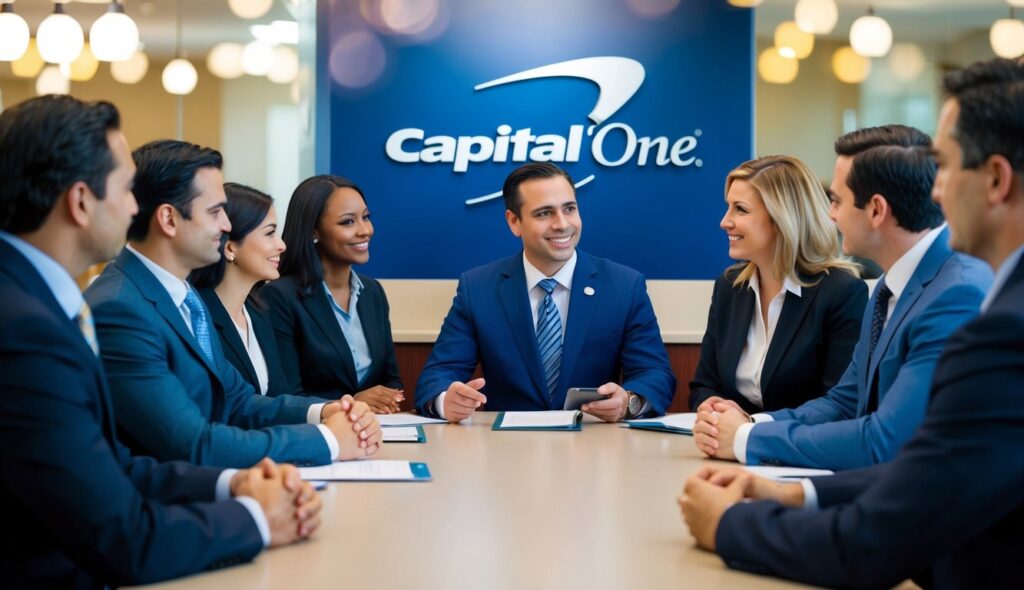
What is involved in the Capital One job interview?
This interview evaluates whether your values and work style match the company’s culture. You might discuss your career goals and how they align with Capital One. Understanding the company’s mission can help you prepare.
What strategies are most effective for answering situational questions in a Capital One interview?
For situational questions, practice thinking about your experiences in advance. Identify key examples that highlight skills relevant to the role.
Structure your answers clearly, focusing on results achieved.
All the Best !

